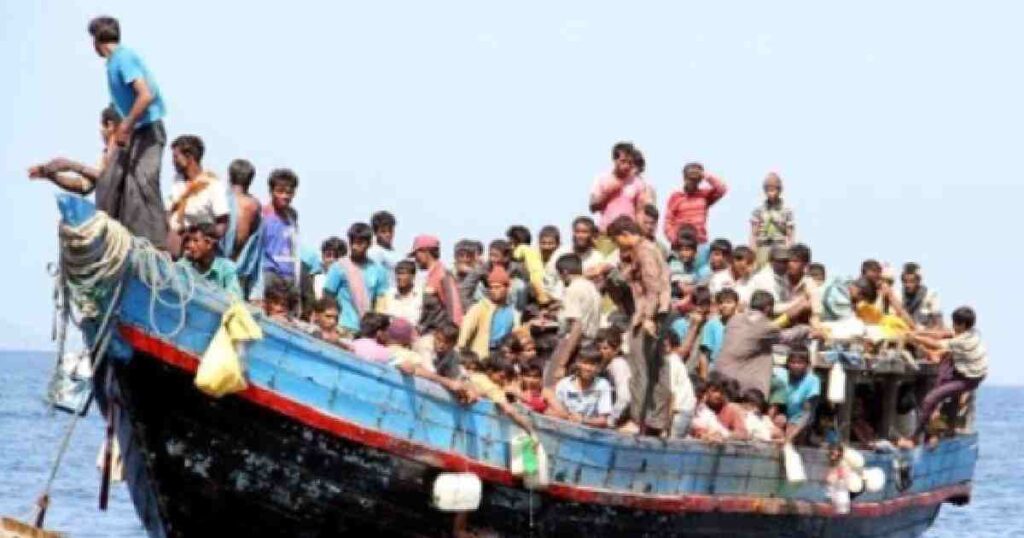They’ll return to camps after quarantine
- Nayadiganta English Desk 01 May 2020
UNHCR, the UN refugee agency, has said nearly 400 Rohingyas who arrived by boat recently are mostly registered with the Rohingya camps in Cox’s Bazar district.
“We’re still completing individual interviews with all of the newly arrived refugees. So far, no refugee claims to have boarded from Myanmar,” Louise Donovan, a Spokesperson at Cox’s Bazar office of the United Nations High Commissioner for Refugees (UNHCR), told UNB.
At the end of the 14 days quarantine period, they will return to their families and their shelters within the camps, said the official at the UNHCR mentioning that the vast majority are already registered in Cox’s Bazar camps.
On April 16, members of the Bangladesh Coast Guard rescued 396 Rohingya people from a boat which was denied entry by Malaysia.
The Bangladesh authorities and UNHCR worked together to facilitate the safe disembarkation of the 400 Rohingyas who arrived by boat.
Under government directives, they are in quarantine to confirm they are free of COVID-19.
These Rohingyas passed through a horrifying ten-week ordeal, where they faced starvation, dehydration and physical abuse, according to the UNHCR.
“Many died and were tossed overboard. With support from the government, UNHCR and our partners, they’re now recovering,” said the UNHCR Spokesperson.
The UNHCR urged greater coordination and responsibility-sharing by States in responding to the dangerous maritime movements of refugees and asylum-seekers.
“We’re confident that the public health imperatives related to COVID-19 and the need to protect people seeking refugee can be met together. They aren’t mutually exclusive,” said the UNHCR Spokesperson.
Boats with Rohingyas Denied Entry by Countries
UNHCR said they has received reports of boats with Rohingyas aboard being denied entry to countries in the region.
Foreign Minister Dr AK Abdul Momen explained that the nearly 500 Rohingyas, now on two boats, are not in or even near the Bangladesh maritime border.
He pointed out that according to the law of the seas, other countries in the region have responsibilities to save the Rohingyas.
“Bangladesh has shouldered very heavy responsibilities for the Rohingya refugees and must not be left alone to deal with these challenges,” Steven Corliss, UNHCR Representative in Bangladesh told UNB mentioning that turning desperate people away cannot be the answer.
The UNHCR said they are deeply concerned about the fate of the people on these boats, as weather conditions can change rapidly in the Bay of Bengal during this season.
According to some reports, the UN refugee agency said, the people aboard have little food or water.
The UNHCR Spokesperson said they have contacted the government requesting that the people be allowed to safely disembark and providing assurances that UNHCR would ensure their safe quarantine as a precaution against any possible risk of COVID-19 infection.
Bangladesh said it does not want to see a single loss of life at sea and it is time for other countries to come forward and share the responsibility.
Despite limited resources, Bangladesh has already given shelter to around 1.1 million Rohingyas on humanitarian ground.
UN High Commissioner for Human Rights Michelle Bachelet, UNHCR and the Human Rights Watch requested Bangladesh to accept the rest of the Rohingyas floating at deep sea.
Bangladesh responded to those requests noting that Bangladesh has not taken sole monopoly approach of sheltering Rohingyas.
Bangladesh sent letters to them citing the International Law that it is the responsibility of surrounding countries of the Bay of Bengal and the Andaman Sea to share the responsibility of helping the distressed people on the deep sea.
There are eight countries in the region namely Myanmar, India, Thailand, Sri Lanka, Malaysia, Singapore, Indonesia and Bangladesh.
Bangladesh made it clear that humanitarian disaster created by Myanmar must not be the sole responsibility of Bangladesh in the world to shoulder it.
Ongoing War Crimes in Rakhine
Yanghee Lee, who is concluding her tenure as UN Special Rapporteur on the situation of human rights in Myanmar, has called for an investigation into allegations of ongoing war crimes and crimes against humanity in Myanmar’s Rakhine and Chin States.
“While the world is occupied with the COVID-19 pandemic, the Myanmar military continues to escalate its assault in Rakhine State, targeting the civilian population,” said the UN expert.
She said calls for a ceasefire, including by the Arakan Army, have gone unheeded. “Instead, the Tatmadaw is inflicting immense suffering on the ethnic communities in Rakhine and Chin,” Lee said.
She said the Myanmar military is systematically violating the most fundamental principles of international humanitarian law and human rights.
Its conduct against the civilian population of Rakhine and Chin States may amount to war crimes and crimes against humanity.
For decades, Lee said, its tactics have intentionally maximised civilian suffering.
“We all know what they did to the Rohingya in 2017. They are now targeting all civilians in the conflict area, with people from Rakhine, Rohingya, Mro, Daignet and Chin communities being killed in recent months. Their alleged crimes must be investigated in accordance with international standards, with perpetrators being held accountable.”
She called on the United Nations to step up its efforts to protect civilians in Rakhine and Chin and ensure that there is not another systemic failure like in 2017.
The human rights expert said Myanmar and its security forces must abide by the International Court of Justice’s provisional measures and its own Presidential directive to respect the Genocide Convention.

